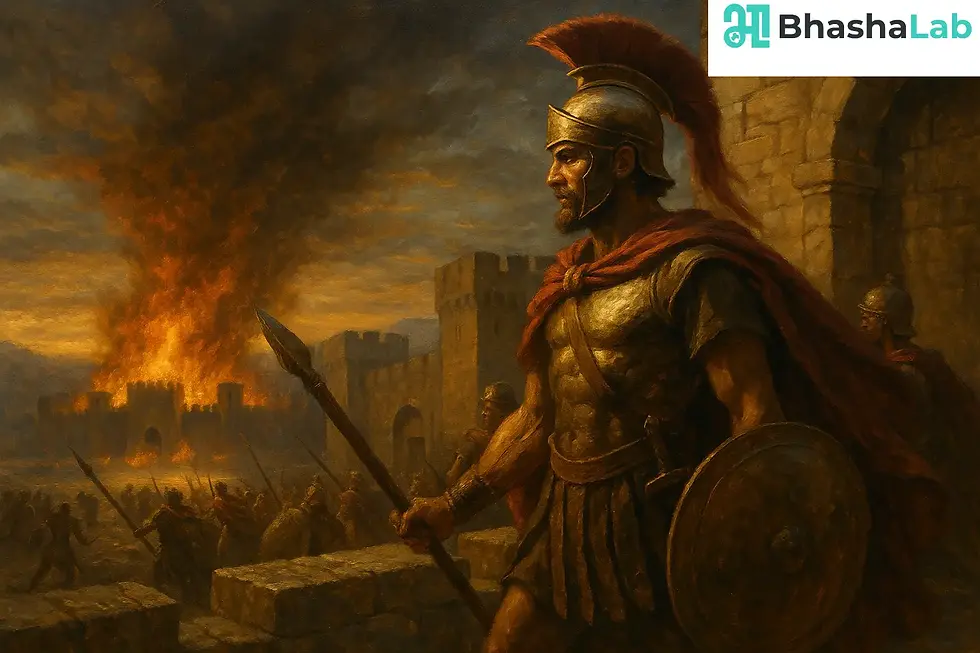2.4 The Fall of Troy - Part I - Std 9 - Kumarbharati
- Aug 5, 2025
- 4 min read
Updated: Aug 16, 2025

Author: Retold from Homer’s The Iliad
Genre: Mythological Narrative / Epic Retelling
Textbook: English Kumarbharati – Std X
Board: Maharashtra State Board
English Summary
This lesson is a retelling of Homer’s epic The Iliad, which narrates the story of the ten-year-long Trojan War. The conflict began when Paris, a Trojan prince, took Helen, the wife of Greek king Menelaus, to Troy. In response, Greek kings and heroes laid siege to Troy to bring her back. Troy, a prosperous city protected by strong walls and brave warriors, resisted for ten years. Many battles were fought and great heroes like Hector and Achilles lost their lives. Ultimately, the Greeks used clever tactics (to be detailed in Part II) to conquer the city. The lesson highlights the bravery of warriors, the causes of war, and the fall of a once-mighty city through a blend of history and mythology.
Theme / Central Idea
The lesson explores themes of pride, betrayal, bravery, and the downfall of powerful civilizations. It also shows how myth and legend reflect cultural values and historical truths.
Character Sketches
1. Paris
A prince of Troy
Handsome but selfish and impulsive
Eloped with Helen, causing the war
Ultimately killed by a poisoned arrow
2. Hector
Brave Trojan warrior and leader
Loyal to his city and people
Fought valiantly for nine years
Killed by Achilles in a duel
3. Achilles
Greatest Greek warrior
Fierce and undefeated in battle
Killed Hector but later died due to a poisoned arrow in his heel
Word Meanings
Word/Phrase | Meaning in Simple English |
Epic | A long poem about heroic deeds |
Siege | A military blockade to force surrender |
Elope | Run away secretly to get married |
Fortress | A strong protected building |
Prosperous | Rich and successful |
Throng | Crowd |
Hospitality | Welcoming and treating guests kindly |
Trading city | A city involved in the buying and selling of goods |
Recited | Spoken aloud, often from memory |
Wounded | Hurt or injured, especially in battle |
Grammar Questions
Infinitive/Gerund
Sentence: He began to sing his poems.
Question: Identify the infinitive.
Answer: to sing
Passive Voice / Indirect Speech
Sentence: The Greeks attacked Troy.
Question: Change into passive voice.
Answer: Troy was attacked by the Greeks.
Modal
Sentence: The Trojans could not force the Greeks to sail away.
Question: Identify the modal verb and its use.
Answer: could – shows inability
Tense / Transformation
Sentence: The Greeks sailed to Troy.
Question: Change into present continuous tense
Answer: The Greeks are sailing to Troy.
Wh-question framing
Sentence: Paris eloped with Helen.
Question: Who did Paris elope with?
Answer: Helen
💬 Personal Response Questions
Would you consider Paris responsible for the war? Why?
Yes, Paris's decision to elope with Helen, a married woman, triggered a major war. His actions reflect selfishness without concern for consequences.
Do you admire Hector’s role in the story?
Yes, Hector was brave and loyal to his city. He fought with honour and protected Troy for nine years, making him a heroic figure.
Why do you think stories like these remain popular for centuries?
They reflect timeless themes of love, pride, and war. These stories teach moral lessons and connect us with the values of ancient cultures.
Do you believe war is ever justified? Why or why not?
War may sometimes be unavoidable for defence or justice, but it always brings suffering. Dialogue and peace are better solutions.
True or False
Helen was the wife of Paris.
→ False
Hector was killed by Achilles.
→ True
Troy was a weak and poorly protected city.
→ False
Probable Board Questions
Why did the Greeks declare war on Troy?
The Greeks declared war because Paris, a Trojan prince, eloped with Helen, the wife of Greek king Menelaus. It was seen as a great insult.
How was Troy protected during war?
Troy had strong walls, brave warriors like Hector, and a strategic location near mountains and the sea, making it difficult to conquer.
Why is Homer honoured as the Father of European Poetry?
Homer is believed to have composed and recited The Iliad and The Odyssey, which are foundational to European literature.
What does the story of Troy teach us about war?
It teaches that pride, revenge, and personal conflicts can lead to long-lasting wars, causing the downfall of even great civilizations.
Appreciation or Reflection Paragraph
The story “The Fall of Troy” is a gripping retelling of one of the world’s oldest and most famous wars. It introduces us to brave warriors, moral choices, and the consequences of human pride. The narrative style is informative and dramatic, blending myth with historical flavour. I found the character of Hector especially admirable due to his bravery and sacrifice. The lesson also offers insights into how literature preserves culture. Overall, it reminds us of the futility of war and the importance of honour and justice in leadership.
English Worksheet:
About BhashaLab
BhashaLab is a dynamic platform dedicated to the exploration and mastery of languages - operating both online and offline. Aligned with the National Education Policy (NEP) 2020 and the National Credit Framework (NCrF), we offer language education that emphasizes measurable learning outcomes and recognized, transferable credits.
We offer:
NEP alligned offline language courses for degree colleges - English, Sanskrit, Marathi and Hindi
NEP alligned offline language courses for schools - English, Sanskrit, Marathi and Hindi
Std VIII, IX and X - English and Sanskrit Curriculum Tuitions - All boards
International English Olympiad Tuitions - All classes
Basic and Advanced English Grammar - Offline and Online - Class 3 and above
English Communication Skills for working professionals, adults and students - Offline and Online
Contact: +91 86577 20901, +91 97021 12044
Mail: info@bhashalab.com
Website: www.bhashalab.com





Comments